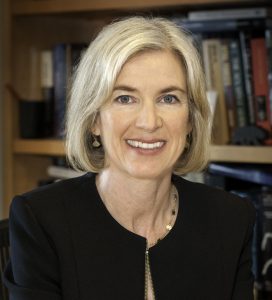Engineering the Genome: How CRISPR Systems Work
Jennifer Doudna
Professor of Chemistry and Molecular and Cell Biology
University of California, Berkeley
Friday, April 19, 2019
3:00 p.m., 34-101
2:30 p.m. Reception
Abstract:
Genome editing with CRISPR technology is transforming biology. CRISPR-Cas9, an RNA-guided enzyme with remarkable abilities to recognize and cleave DNA, operates by mechanisms that both explain its biological function and provide insights into technology development. I will discuss research into this amazing family of proteins: where they came from, how they work and how Cas9-based technologies are revolutionizing research, biomedicine and agriculture. I will discuss how bacterial CRISPR adaptive immune systems inspire creation of powerful genome editing tools, enabling advances in both fundamental biology and applications in medicine. I will also discuss the ethical challenges of some of these applications.
Bio:
Jennifer A. Doudna, Ph.D
As an internationally renowned professor of Chemistry and Molecular and Cell Biology at U.C. Berkeley, Doudna and her colleagues rocked the research world in 2012 by describing a simple way of editing the DNA of any organism using an RNA-guided protein found in bacteria. This technology, called CRISPR-Cas9, has opened the floodgates of possibility for human and non-human applications of gene editing, including assisting researchers in the fight against HIV, sickle cell disease and muscular dystrophy. Doudna is an Investigator with the Howard Hughes Medical Institute and a member of the National Academy of Sciences, the National Academy of Medicine, the National Academy of Inventors and the American Academy of Arts and Sciences. She is also a Foreign Member of the Royal Society, and has received many other honors including the Breakthrough Prize in Life Sciences, the Heineken Prize, the BBVA Foundation Frontiers of Knowledge Award and the Japan Prize. She is the co-author with Sam Sternberg of “A Crack in Creation”, a personal account of her research and the societal and ethical implications of gene editing.


